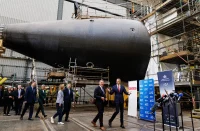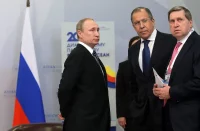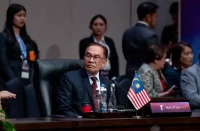Aurobinda MAHAPATRA (India)
With the three day visit of the President of Turkmenistan Gurbanguly Berdimuhamedov to India, leading to deliberations on diverse areas including cooperation in the areas energy, the prospects of realization of Turkmenistan – Afghanistan – Pakistan – India (TAPI) project has appeared in sight. After hectic parleys on 25th of May, both the countries signed five agreements encompassing diverse fields of trade and commerce, and cultural and scientific relations. However, it was the cooperation in the field of energy that figured prominently during the visit. The meeting of India’s Petroleum Minister with the Turkmen delegation including the President appeared prominent in this context. The joint statement issued after the deliberations mentioned the seriousness of both the countries to take the next step towards realization of the project.
India offered to the Central Asian country with rich natural gas to host technical meeting of experts under the aegis of Asian Development Bank (ADB) in New Delhi. The ADB, which completed a feasibility study of the project in 2005 and updated in 2008, is likely to finance the project. Since the finalization of project in 2008, the countries involved have expressed keen interest to complete the 56-inch diameter pipeline starting from Dauletabad field in Turkmenistan and then passing through Herat and Kandahar in Afghanistan and Multan in Pakistan to Fazilka at the Pakistan – India border. The pipeline originally estimated to cost $3.3billion has been more than doubled at the present cost due to the high price rise of steel and other equipments in building the pipeline. As per the plan in 2008 the construction work is supposed to start in 2010 and gas delivery in 2015. Indian gas company during the visit of Turkmen President expressed interest to invest in the Turkmenistan gas and lay the pipeline on the bottom of the Arabian Sea.
India’s policy makers too have explored the options to engage in a swap deal with the Central Asian gas power. India is interested in the proposal of delivering the Turkmen gas to Iran, and in return import gas from the southern gas fields of Iran in a reciprocal manner. India is apprehensive about the security and safety of the pipeline that will pass through troubled areas of Pakistan. Indian establishment now appears confident about the laying of the pipeline on the sea bed. Some sections of the establishment argue that the idea of under sea pipe line which appeared not feasible a decade ago has become possible currently with the development of technology. The South Asia Gas Enterprise Pvt. Ltd. has envisaged a Middle East natural gas gathering system, which will aid in connecting gas sources to the coast of the Arabian peninsula. Reportedly, it has finalized a memorandum of understanding with National Iranian Gas Export Company for developing gas exports through the sea route bypassing Pakistan. The Gas Authority of India Limited also has entered into understanding with this company for delivering gas through the sea route. However, the pipeline has to pass through the continental shelf of Pakistan.
India, the third most powerful Asian power, has attempted to widen its energy network to meet growing demands at home. India’s oil product consumption in 2009-2010 rose an annual 3.5 percent in contrast to the government estimate of 2.4 percent. On the other hand its annual crude oil output rose 0.5 percent and gas output was up about 45 percent, which appeared meager to meet growing demands. During the visit of Berdimuhamedov, Indian side expressed keen interest to develop joint projects in Turkmenistan gas sector. India’s Oil Secretary told the press on 25 May that the government of India is exploring cooperation at some of the gas blocks, and stated, “We offered to invest in onshore gas producing fields.” India has also proposed to establish a gas based fertilizer plant in Turkmenistan. The TAPI pipeline as per the original proposal will deliver 3.2 billion cubic feet natural gas per day and will help meet regional energy requirements. If it comes through Pakistan it will also help meet energy requirements of Pakistan as well. The India – Pakistan rivalry and sharp differences over bilateral issues mar the prospects of pipeline as originally envisaged.
The energy rich Central Asia particularly Turkmenistan provides a viable option in meeting the energy crunch of South Asia including that of India. Perhaps Turkmenistan’s balancing policies and its postures in not involving in power politics as vigorously as other players makes it stand in good stead to emerge as a gas power in the region. India too has adopted a non-antagonizing approach with the players in the region. Its equations with Russia, the most powerful player in the region have been in good shape. The March 2010 visit of Russian Prime Minister, Vladimir Putin and the November 2009 visit of Russian President, Dmitry Medvedev reflected the commitment of both the powers to develop common approach on various bilateral and multilateral issues. Russia has played an important role in the regional dynamics and in the evolving India – Turkmenistan gas cooperation it can play a dynamic role in fostering the cooperation.
The recent deliberations between Turkmenistan and India will strengthen cooperation between the two countries and help India meet its energy requirements partially, if not fully. During the visit, both the countries signed agreements in various fields including granting visa free travels to diplomatic passport holders, cultural and scientific exchange programmes, establishment of academic chairs in Turkmenistan institutes, etc. Both the countries also emphasized that the India-Turkmenistan Inter-Governmental Commission on Trade, Economic, Scientific and Technological Cooperation and the Joint Working Group on Hydrocarbons should be held regularly. The joint statement also emphasized on the ongoing discussions between the oil/natural gas companies of India and Turkmenistan under the framework of the Joint Working Group on Hydrocarbons and expressed the hope that “the discussions on the TAPI gas pipeline project would continue with a view to realize it early.” However, it will require diplomatic manoeuvre and political acumen for the smooth realization of the deal amidst complexities involved in the regional politics.
________________________
Dr Debidatta Aurobinda Mahapatra is a fellow of the research faculty at the Centre for Central Eurasian Studies, University of Mumbai, India.
Source: Strategic Culture Foundation















I’ve been looking for this type of information for my research. Thanks